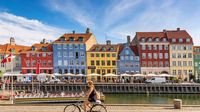On March 20, 2025, the World Happiness Report was released, revealing that Finland has secured its title as the happiest country in the world for the eighth consecutive year. Published by the United Nations Sustainable Development Solutions Network in collaboration with the Wellbeing Research Centre at the University of Oxford, this annual report assesses happiness levels across 147 countries.
Finland, with a score of 7.736, is followed by Denmark, Iceland, and Sweden, which continue to dominate the rankings. The report emphasizes that the happiest nations often share similar attributes, including high GDP per capita, robust social support systems, and low levels of corruption. Interestingly, despite being one of the wealthiest countries globally, the United States remains stagnant in its happiness ranking, coming in at the 24th position.
Dr. Heli Jimenez from Business Finland characterized Finnish happiness as rooted in simple pleasures such as nature, well-being, and culture. “Finnish happiness boils down to the simple things in life: connecting with nature, caring for one’s mind and body, and appreciating design and art around us,” she conveyed.
The report highlighted that a significant portion of the global population engages in acts of kindness. Approximately 70% of individuals across the world performed at least one kind act in the past month, a notable figure as reported by Dr. Felix Cheung, an assistant professor of psychology at the University of Toronto. He stated, “That’s a really, really high number. We should just look at that number and feel really good.”
This evidence of benevolence shows a slight decrease from the peak during the COVID-19 pandemic, yet indicates a positive shift from pre-pandemic times. Dr. Lara Aknin, a social psychologist, emphasized that engaging in acts of generosity can enhance happiness, noting, “Acts of generosity predict happiness even more than earning a higher salary.”
In light of these findings, the report illustrates an “empathy gap” prevalent in perceptions of kindness, especially in the United States. For instance, the U.S. ranks 52nd in people’s belief that strangers would return a lost wallet, illustrating a drop in social cohesion. “If we assume the worst of others, it shapes how we interact with the world,” Aknin remarked.
Overall, the report suggests that building trust within communities can significantly enhance overall happiness. The simple act of eating together, for example, has been statistically shown to improve subjective well-being, making meal-sharing a crucial factor in promoting happiness.
As a result of its favorable societal conditions, Finland, alongside other Nordic countries like Denmark and Iceland, has maintained its lead on the happiness index. In contrast, countries with less favorable social dynamics, such as Afghanistan—recorded as the unhappiest country with a score of 1.364—exhibit vast disparities in happiness levels.
The World Happiness Report continues to inspire global conversations about the necessity of community trust, kindness, and generosity to improve individual and societal happiness. As we reflect upon this year’s findings, it is evident that, while happiness can be challenging to quantify, the collective data provides valuable insights into what contributes to a contented life.




